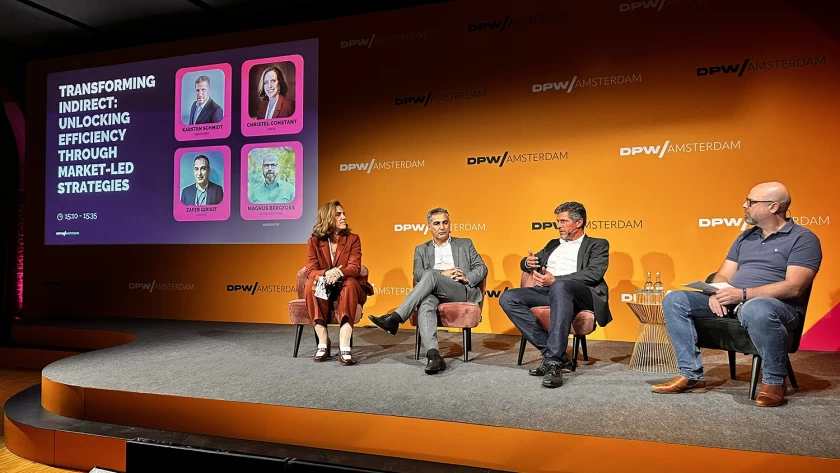To adapt to this evolving landscape, procurement professionals in both B2B and the public sector are rapidly adopting market-led strategies. These strategies aim to reduce costs, minimise dependency on a single source, and build robust supply chain resilience.
What is a market-led strategy?
Market-led strategies create an environment where supply and demand interact smoothly, ensuring transparency for buyers and fairness for suppliers.
It is especially well-suited for indirect procurement, an area that is often overlooked or less adequately staffed. Leveraging platforms with market-driven processes is recommended to harness competitive advantages, while preserving control and transparency.
This approach includes:
Multi-supplier sourcing: buyers access a wide range of vetted suppliers while maintaining supplier neutrality.
Buyer-focused experience: advanced search tools cater to buyer preferences including ways to track CO2 reporting, ensuring compliant procurement without sacrificing speed or flexibility.
Streamlined supplier management: a single creditor model simplifies the complexity of managing multiple suppliers, reducing process costs.
Which is why market-led strategies was an eagerly anticipated topic of discussion at the recently concluded Digital Procurement World (DPW) in Amsterdam.
DPW panel discussion:
During a panel led by Unite Board Member Christel Constant, procurement leaders from Bertrandt and Arkema shared valuable insights into the versatility of Unite’s platform in their respective organisations.
The discussion reiterated how the Unite platform, with its market-led approach, can be easily adapted, offering both centralised control and decentralised flexibility, depending on organisational needs.
What stood out:
It’s interesting that Bertrandt leverages Unite for framework agreements and catalogue-based procurement, streamlining supplier management and optimising indirect procurement across its 50 global sites. By benchmarking the prices in its framework agreements against marketplace alternatives, Bertrandt adopts market-led strategies to secure competitive pricing and drive cost optimisation.
While on the other hand, Arkema has implemented a ‘buyerless procurement’ strategy, using the same platform to decentralise purchasing across its business lines while maintaining compliance and visibility.
So, rather than navigating competing channels – such as the marketplace versus framework agreements – the Unite platform provides an integrated view that mitigates the common issue of siloed management in traditional e-procurement systems. Unite provides compliant purchasing from buyer’s framework agreements and supplier catalogues side by side with its integrated marketplace assortment, all under a single contract, contact, and creditor. It enhances collaboration and efficiency, enabling organisations to manage agreements more effectively, leverage procurement resources, and drive supplier consolidation for stronger negotiation power.

Transform your indirect catalogue-based procurement with Unite. Consolidate your spend, access 100+ million vetted products, and streamline processes with one contact, contract and creditor.
Expert insights
Bertrandt and Arkema each leverage the Unite platform in unique ways, demonstrating distinct approaches to market-led strategies within indirect procurement.
Bertrandt’s use of framework agreements
The engineering company, with over 14,500 employees, utilises Unite to efficiently manage its large supplier base for catalogue-based indirect material purchases. With Unite, Bertrandt can compare suppliers in its framework agreements against marketplace alternatives across key criteria, like price, shipping times, and ESG credentials.
This centralisation supports Bertrandt in making strategic, transparent decisions while efficiently meeting its indirect procurement needs. Last but not least, it reduces process costs in supplier negotiations, minimising reliance on extensive sourcing efforts.
Arkema’s buyerless procurement
With over 21,000 employees worldwide, this chemical company has embraced a buyerless procurement strategy by decentralising purchasing decisions. With Unite’s platform, Arkema enables individual business lines to make direct purchases while maintaining oversight and compliance.
As Zafer Girisit, Head of Operations and Purchasing Coordination EMEA at Arkema, highlighted: “Unite gives requesters access to suppliers, while allowing us to track activity and ensure compliance across our global operations.”
Achieve ESG goals with a market-led approach
Sustainability is a growing concern for procurement leaders. According to a fourth edition of the EY’s ‘long-term value and corporate governance’ survey, “boards have a duty to help reinforce a business culture where sustainability is seen as mission critical”.
With new EU regulations expected to come into effect in stages, including the Corporate Sustainability Due Diligence Directive (CSDDD), and some regulations already in place, such as the Corporate Sustainability Reporting Directive (CSRD), businesses are making changes in their sustainability governance capabilities.
A surefire way to ensure such capabilities is through market-driven solutions that build transparency into supplier credentials and carbon footprints. There are tools to enable companies to make informed decisions, fostering competition among suppliers to meet high sustainability standards
Unite's platform directly addresses this with a CO2 reporting tool that helps businesses visualise carbon footprint on purchases. This makes it easy to comply with sustainability reporting standards like the GHG Protocol Scope 3 and the Corporate Sustainability Reporting Directive.
Christel Constant, Executive Board Member at Unite, explained further: “Unite gives procurement professionals the tools to assess suppliers based on sustainability criteria, helping organisations meet their ESG targets.”How has Arkema adopted a market-led strategy?How can a market-led approach help businesses achieve ESG goals?
Sustainability goals
Unite supports companies’ sustainability goals by offering tools that improve CO2 reporting and supplier transparency.

CO2 reporting tools
Unite provides reporting on the carbon footprint of procurement activities. Stay compliant with international reporting standards like the GHG Protocol. Read more about our reporting tool.

Sustainable sourcing
Make informed responsible procurement decisions. And prioritise ESG-compliant suppliers to drive long term value across the supply chain.

Cost savings
By working with a wide range of suppliers, companies can compare prices and avoid over-reliance on single vendors.

Supplier accountabilty
Unite makes it easy to evaluate suppliers based on key factors, like pricing, delivery and ESG credentials.

Unite’s recent EcoVadis Gold rating and its Fair Tax Mark accreditation further underscore its commitment to sustainability, offering peace of mind to procurement leaders looking to make ethically responsible decisions.
A market-led approach is where supply and demand interact seamlessly, ensuring transparency for buyers and fairness for suppliers. It’s ideal for indirect procurement and typically includes multi-supplier sourcing, a buyer-focused experience and streamlined supplier management, such as a single-creditor model.
Bertrandt has adopted a market-led strategy to secure more competitive pricing and drive cost optimisation. To achieve this, the organisation uses Unite for framework agreements and catalogue-based procurement. It benchmarks its framework agreements against marketplace alternatives, streamlining supplier management and optimising indirect procurement across its 50 global sites.
Arkema has adopted a market-led strategy by implementing ‘buyerless procurement’, decentralising purchasing decisions. It uses Unite to enable individual business lines to make direct purchases while maintaining oversight and compliance. Unite gives Arkema an integrated view, giving requesters access to suppliers, while removing the common issue of siloed management.
Market-driven solutions that build transparency into supplier credentials and carbon footprints enable organisations to make more informed decisions. These tools also foster competition between suppliers, encouraging them to step up and start meeting high sustainability standards.
Unite has built-in tools to help you achieve your sustainability goals, including CO2 reporting tools to help you stay compliant; sustainable sourcing to help you prioritise ESG-compliant suppliers; price comparison to help you avoid reliance on single vendors; and easy supplier evaluation across pricing, delivery and ESG credentials.
Find out more about procurement strategies in our stories and insights section

Event highlights from DPW Amsterdam 2024
Event date: 08.10.24 - 10.10.24
It was a remarkable opportunity to engage with decision-makers and present how Unite can drive transformative change in procurement.

Strategic, tactical and operational procurement
Find out why these three approaches are fundamental to corporate procurement.

Unite participates in the UN Global Compact
Unite is not just committed to sustainability; we are actively pursuing it. Our recent membership in the UN Global Compact (UNGC) is a testament to this.

Efficient procurement in four easy steps
Steps businesses must take to acquire goods and services to operate efficiently.


